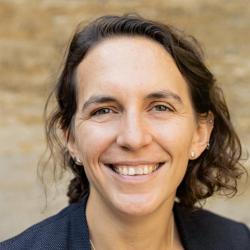Submitted by H.E. Baker on Tue, 16/08/2022 - 17:36
Last month Dr Hannah Baker joined the Strategic Partnerships Office as the Decarbonisation Network Coordinator. We asked her some questions about her aspirations for the Network.
What did you do before joining the Network?
From 2014 to 2019, I completed my PhD through the Future Infrastructure and Built Environment Centre for Doctoral Training (FIBE CDT) programme at Cambridge University. My thesis focused on stakeholder perspectives on decisions to demolish or adapt existing buildings. I identified a range of issues including: the technical feasibility of adaptation, planning constraints including heritage designations, and life-cycle energy analysis. In recent years the topic has become particularly apt, for example the Architects’ Journal’s RetroFirst campaign, as there is a growing recognition that embodied energy needs to be considered when making these types of decisions. Following my PhD and directly before joining the Decarbonisation Network, I was a Research Associate (RA) at the Centre for Arts, Social Sciences and Humanities (CRASSH). My project focused on the use of experts in emergencies. Topics I focused on included the circulation of scientific evidence and information on social media and the communication of uncertainty in scientific advisory documents.
Why did you want to join the Network?
Throughout my own research career, I benefited from collaborations and interdisciplinary working. This including engaging with industry partners during my time on FIBE CDT; academic secondments; and being the lead author on collaborative papers during my RA position, with the latter allowing me to learn from different disciplines.
During my time as a RA, I also co-founded the Cambridge Disaster Research Network, our aim was to connect researchers from different disciplines across the University. We set this up at the start of the COVID-19 pandemic. Therefore, we hosted online seminars during term time and in 2021 organised an online workshop about scenario planning. I really enjoyed running this network, meeting new people and learning about what they were doing. Therefore, when I saw the job advertised to be the coordinator for the Decarbonisation Network, I saw it as an opportunity to transfer these skills to another network which is aligned with my interests.
What are you aspirations for the Network?
Currently the Network has three Special Interest Groups (SIGs), I think it is vital that those already involved in these SIGs continue to engage with one another and at the same time, we expand and include additional representatives from a range of industry and public sectors, as well as academics from a range of disciplines. I also plan to develop more SIGs and identify other clusters of expertise related to decarbonisation within the University. Lastly, potential academic-industry collaborations have been identified in previous meetings, long-term I would like these to be translated into action and see decarbonisation initiatives underway.

